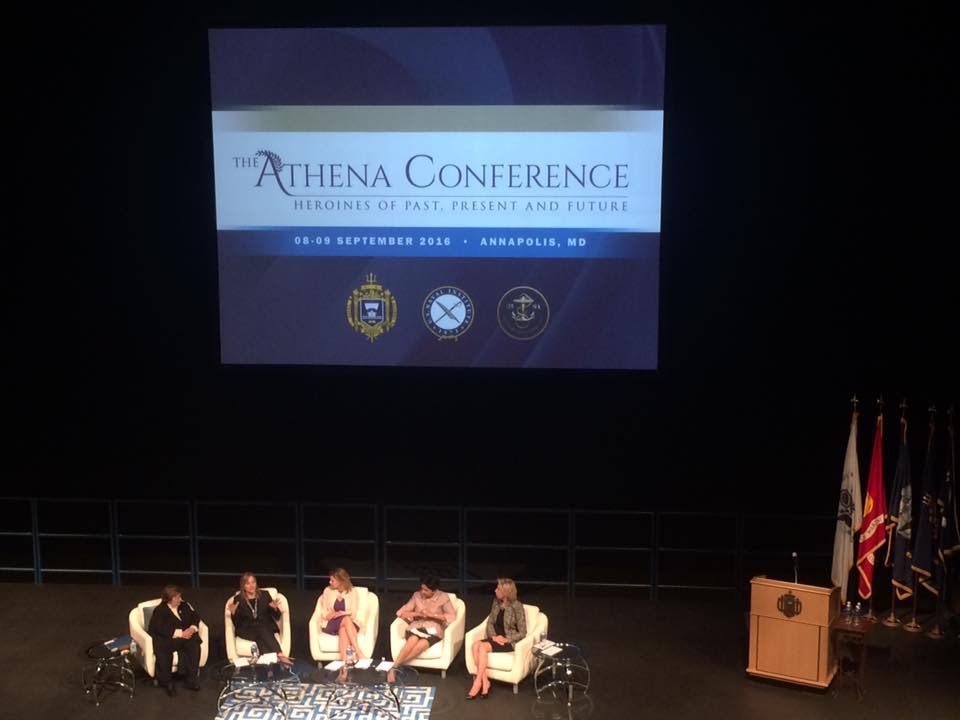By Meredith Newman
The Capital, Annapolis, Md.
WWR Article Summary (tl;dr) This year’s “Athena Conference” in Annapolis is celebrating the 40th anniversary of women being allowed to attend the U.S. Naval Academy. The two-day event features a series of panels of women leaders who are speaking on the challenges and barriers they’ve faced in their respective industries.
The Capital, Annapolis, Md.
When Wilma Vaught was in the Air Force in the 1950s, women were prohibited to rank higher than a lieutenant colonel.
At that time, less than 1 percent of the Air Force included women, she said. They served in limited roles, including nursing.
Yet over the years, Vaught would become the first woman to deploy with an Air Force bomber unit, and one of the first women to reach rank of brigadier general.
“I felt that I had to succeed so that other women would have the opportunity,” she said. “If I failed, it would have been devastating for other women.”
Vaught was one of many high-ranking military leaders to speak Thursday during the Athena Conference in Annapolis, which celebrated the 40th anniversary of women being allowed to attend the U.S. Naval Academy.
The two-day conference began Thursday at the academy and features a series of panels of women leaders who are speaking on the challenges and barriers they faced in their respective industries, including the military, government and business.
One of the conference’s highlights was the Thursday panel, “Blazing the Trail: How did military women clear the path?” More than 600 people attended the conference, many of whom attended the academy or had connections to the military.
At the beginning of the conference, academy Superintendent Ted Carter announced the academy’s new cyber building will be named after Navy Rear Admiral Grace Hopper, the “mother of computing.” This is the first time one of the major service academies has named a building after a woman.
The panelists also included: Janine Davidson, under-secretary of the Navy; Deborah Lee James, secretary of the Air Force; Maj. Gen. Lori Reynolds, the commanding general of Marine Forces Cyber Command; and Vice Adm. Jan Tighe, deputy chief of Naval Operations for Information Warfare.
Throughout the course of the discussion, the women spoke of their time in the military, the hardships they faced and what advice they had for the midshipmen in the audience.
Tighe, a 1984 academy graduate, said she saw a divide between her experiences before graduation and what came after. She didn’t feel championed until she became a naval officer.
“There were plenty of, well, we’ll call them character-building moments, where we saw the best and worst of each other,” she said of her time at the academy.
The vice admiral said she doesn’t view these experiences as “baggage,” but knowledge. The sexism she faced early in her career showed her the kind of leader she wanted to be. She became the first woman commander of a numbered fleet in the Navy.
The expectations for women are “completely different” from what they were decades ago, said Reynolds, a 1986 academy graduate. The major general, who is the first woman commander at the South Carolina military base Parris Island, said women entering the military can do anything they want.
“That doesn’t mean it’s not going to be hard for them,” she quickly added.
Reynolds advised the female midshipmen to focus on their studies and what specialty they’re interested in, not any sexism they might face.
“Don’t go looking for bias, because you’ll find it. You’ll absolutely find it,” she said. “When it comes to you, you’ll figure it out day by day.”
One of the major themes of the panel was the idea of women “having it all” personally and professionally. When deciding whether to have a family, no choice is the wrong choice, said James, the secretary of the Air Force.
Women can’t be Superwoman and do everything, but it’s possible to have a career and a family, James said.
“It comes down to a matter of priorities and willing to look yourself in the mirror and say ‘I can’t do everything and I can’t do it all equally well,'” she said.
James added that the midshipmen should be prepared to “zig zag” throughout their careers, since plans or goals don’t always work out.
This piece of advice was poignant for Midshipman 1st Class Madina Petashvili since she’s graduating at the end of the year. The mid said she found the panel to be “really, really motivating and inspiring.”
Petashvili added that she liked how the women addressed their hardships with a positive perspective. It could have been easy for them to solely focus on their bad experiences, she said.
“They just talked about what worked for them,” she said. “Nothing up there was negative.”
The panel concluded with the speakers discussing future opportunities for women, specifically combat positions. In December 2015, Defense Secretary Ash Carter said that starting in 2016 all combat jobs are available to women.
As under-secretary, Davidson is tasked with the responsibility of helping integrate women into all areas of the Navy. Right now, she’s planning how to assimilate women while focusing on combat effectiveness and not lowering standards.
Two weeks ago, she received a document containing instructions of all the roles women weren’t able to have in the Navy.
Before it was sent to the Secretary of the Navy, her signature was needed to negate those instructions.
She signed it, and slapped a yellow Post-it note with a happy face.
“I think we’ve come a long way … I have a lot more faith in this generation,” Davidson said. “You guys are awesome.”














































































































































































































































































































































































